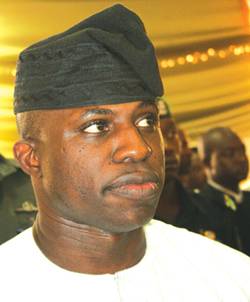Date Published: 05/22/11
N70 Billion Bank Loan: Rep Appropriation Chairman confirms Pointblanknews Report
 |
Outgoing Speaker, Dimeji Bankole |
An outgoing member of the House of Representatives and Chairman of House Committee on Appropriation, Mr. Ayo Adeseun has confirmed that indeed the leadership of the National Assembly particularly, the House of Representatives had approached two banks for another loan but were turned down.
Pointblanknews.com had exclusively reported that Attempts by the outgoing leadership of the National Assembly , led by David Mark ,and Dimeji Bankole, to get a dodgy N70 Billion bond from two banks were frustrated by the Governor of Central Bank (CBN), Sanusi Lamido Sanusi.
Senate President Mark and Speaker Bankole were alleged to have approached GTBank and Intercontinental Bank for the N70 Billion bond following the financial crises that have hit the National Assembly, especially the House of Representatives.
Adeseun, a Senator-elect at the weekend confessed that the banks became skeptical of giving more loans to the House due to the failure of Bankole and his deputy Usman Nafada to get re elected. He said the bank feared that the incoming leadership might refuse to pay the debt because it was not a party to the deal.
According to Adeseun, the N10 billion loans was spent on allowances paid to members to perform some legislative duties last year, but which were not provided for in the 2010 budget. He said the House sourced the money from banks with the intention of providing for it in the supplementary budget.
The outgoing Rep Member during the retreat for state and National Assembly members-elect organized by the CAN in Ibadan, the Oyo State Capital, said the House could not make provision for it again in the supplementary budget due to the outcry that greeted Sanusi’s allegation last year.
He also criticized the media for dwelling so much on the allegations by the Central Bank of Nigeria (CBN) Governor Sanusi Lamido Sanusi that the National Assembly was taking about 25 per cent of the country’s total budget. He said that affected the ability of the House to repay the loan.
Adeseun explained that provision was made for the debt in the 2011 budget, but that the President refused to sign the budget for being bloated.
He insisted that the budget had always been enlarged by the National Assembly because the lawmakers wanted more money allocated for building of infrastructure to allow a steady improvement of utilities that are capable of helping Nigerians to build wealth and ultimately help the economy to grow.
He lamented that the refusal to sign the Appropriation Bill into law shattered the hope of getting funds to repay the debt, which ballooned into a national embarrassment for the legislators in the last 15 days.
Adeseun said the National Assembly passed the budget based on $75 per barrel of crude oil but that the Executive insisted on a $65 benchmark.
The senator-elect said the lawmakers increased the benchmark because the excess income generated from crude goes into the Excess Crude Account, which the Federal Government just shares like booties with states and local governments without being able to point at tangible projects achieved with the large sum.
Since a barrel currently sells in excess of $100, Adeseun explained that it was sensible for the lawmakers to reason that rather than deliberately make way for huge sums going into the excess crude account, which the three levels of government do not maximize to the benefit of the masses, it was better that the Assembly budgeted more of the income for feasible projects that will benefit Nigerians.
He said: “When the budget was passed in 2010, there were areas of omission which the House had to source funds for. But for the fact that the President has not signed the 2011 budget, the issue would have been resolved. Why did President Jonathan refuse to sign the budget? He said it was too large. We have always insisted on shoring up appropriation for infrastructure. We believe that infrastructure must be seriously improved to allow businesses grow and allow more Nigerians to make wealth. Power, roads, health and education need improved appropriation. And we need to do this so that meaningful progress can be made. We also believe that the $75 benchmark for crude is right because a barrel currently sells for more than $100,” he said.
Adeseun, however, expressed confidence that the financial logjam would be resolved within days, pointing out that efforts had already reached the advanced stage to get a solution.
He decried the embarrassment the scandal has caused members of the House, particularly the leadership, stressing that it undermines the quality of work which the House has done in the last four years. He also described it as a “disservice to the nation itself”.
|